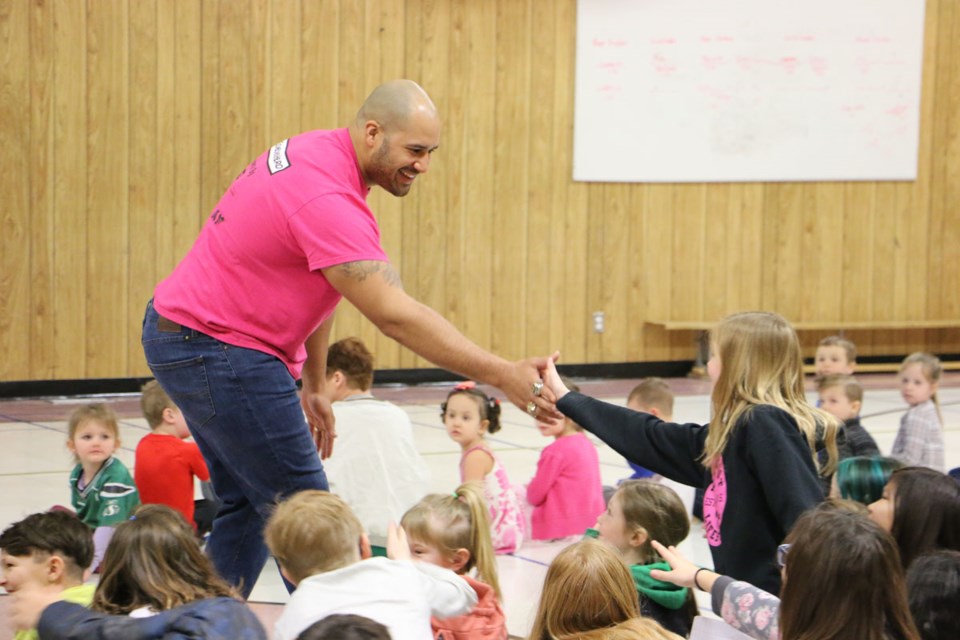Pink Day began in 2007 when a young student was bullied in Berwick, Nova Scotia, for wearing a pink shirt. Two students in an older grade went out that evening and acquired 50 pink shirts, handing them out the next day at school. In a stand against bullying the two older students: David Shepherd and Travis Price helped start a movement that swept the country and has since spread internationally.
This year for Pink Day, Arcola School welcomed Eddie Steele – a defensive lineman with the Saskatchewan Roughriders – to present Red Cross’ Pink Day presentation, while also using instances from when he grew up to explain why it’s important to be good to each other and the differences between bullying and joking around with friends.
“We all face tough times in life, but it’s about how we respond to those tough times,” Steele said.
He began the presentation by asking students to think about a group of three or four friends and what a healthy relationship between them looked like – laughing, smiling, sharing, joking around, etc…
“When you see someone smile it makes you feel welcome, it makes you feel safe,” he said. “When I walked into this school I didn’t know anybody, but people smiled and welcomed me. It made me feel good.”
Key words that Steele focused on regarding healthy relationships included respect, trust, communication, conflict resolution, fun, supportive, equal, safe, and respectful of each other’s boundaries.
Steele then spoke about bullying and how it is repeated, unwanted, aggressive behaviour involving some form of a power imbalance.
The different types of bullying include verbal, physical, social, and cyber bullying.
“If you’re being bullied you need to know it’s not your fault,” Steele said. “Bullying is a learned behaviour.”
“When I was in school I wanted to be liked so badly that I’d make fun of others; I was self-conscious though. Looking back I can’t believe I had that kind of lack of respect for others. I teased kids so badly that they cried and as a 29-year-old man now looking back on that, I’m ashamed of it.”
When it comes to whether the banter between people is joking or bullying Steele told the students to check four things: is the joking going both ways, are both people having a good time, is this behaviour fun, and has anything happened between these people before?
In the cyber bullying realm it becomes easier for bullies to say things that they may not otherwise say; thus, Steele brings to light four rules to think about before posting online.
The Golden Rule – treat others how you want to be treated.
Trusted Adult – what would one of your trusted adults think if they knew that was what you wrote?
Front Page – if that what you wrote appeared on the front page of a newspaper with your photo, would you be alright with what you said?
Real World – would you say what you wrote in a face-to-face conversation with that person?
“Respect is the most important,” Steele added. “You can disagree or have a difference of opinion, but you don’t have to be rude about it. I play football and there are about 80 guys from all over – the locker room is kind of like school – they’re my teammates, just as you have classmates. I don’t like all of my teammates, we don’t all have to be best friends, but we do have to respect each other. We don’t always have to agree with each other, but we do have to respect each other’s opinions.”
When focused on ensuring respectful dialogue, Steele said that assertive communication – straightforward and respectful – is the key.
“You want to respond, but you don’t want to react,” he added. “A reaction is an impulse and it generally ends up worse for you in the long run. So, don’t blurt something out without thinking.”
Stop. Think. Feel. Act.
“The world is so exciting because everybody’s different,” Steele said.
Steele said that his reasons for partnering with Red Cross were related to his youth and how he was when he was younger, but also because of his 10-month-old son, Jackson.
“Working with the Red Cross there was an opportunity to reach so many people with this message. The Red Cross is wanting to reach every student with this message by 2019 in Saskatchewan and right now they’re well on their way to doing that. I also have a 10-month-old baby boy at home who drives me. I don’t want to have him go through that when he grows up.”



